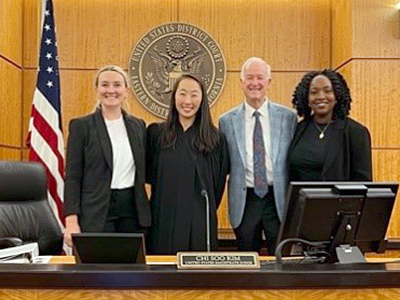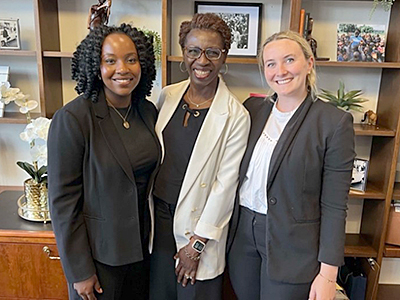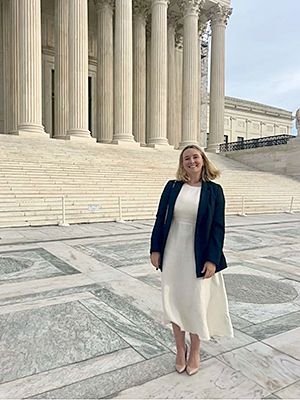Hannah Gilliland
2024 British Pegasus Scholar Report
One of the benefits of other corporate jobs is that there are often opportunities for international travel and secondments. Having become a barrister, and one practising in defamation which is uniquely defined by English and Welsh law, I accepted that such opportunities may not await me. So, when I found out about the Pegasus scholarship and the Washington DC placement, I knew I had to apply.
 The first stop on our US trip was Sacramento, California, and the incredible programme put together by Justice Scotland. California brought so many highlights including attending the Hammy Awards, the award ceremony of the Kennedy Inn of Court, observing trial court proceedings in a highly contested personal injury case in Sacramento County Superior Court, and seeing our names lit up on the floor of the State Assembly. I also thoroughly enjoyed discussing defamation law with defamation attorney Christoper Whelan; the size of the awards and the thrill of trying a case in front of a jury were both aspects that appealed to me about the American system.
The first stop on our US trip was Sacramento, California, and the incredible programme put together by Justice Scotland. California brought so many highlights including attending the Hammy Awards, the award ceremony of the Kennedy Inn of Court, observing trial court proceedings in a highly contested personal injury case in Sacramento County Superior Court, and seeing our names lit up on the floor of the State Assembly. I also thoroughly enjoyed discussing defamation law with defamation attorney Christoper Whelan; the size of the awards and the thrill of trying a case in front of a jury were both aspects that appealed to me about the American system.
 One of the high points of our time in California was learning about appellate advocacy and we were lucky to see multiple instances of this throughout the trip; we visited the Appellate Court of Maryland, the Court of Appeal Third Appellate District in Sacramento, the Supreme Court of California, the Court of Appeal in Phoenix and the Supreme Court of the United States. I was interested to learn that in appellate courts the judiciary would often frontload the case; the judges would have an idea of how the case would be decided before oral arguments were heard. The emphasis on the written brief and the timed oral arguments (policed in some occasions by traffic lights) was also fascinating. While this loses some of the spontaneity and the flexibility of courts to pursue different areas of the argument, I couldn’t help but think that in terms of efficiency, this was a more effective system.
One of the high points of our time in California was learning about appellate advocacy and we were lucky to see multiple instances of this throughout the trip; we visited the Appellate Court of Maryland, the Court of Appeal Third Appellate District in Sacramento, the Supreme Court of California, the Court of Appeal in Phoenix and the Supreme Court of the United States. I was interested to learn that in appellate courts the judiciary would often frontload the case; the judges would have an idea of how the case would be decided before oral arguments were heard. The emphasis on the written brief and the timed oral arguments (policed in some occasions by traffic lights) was also fascinating. While this loses some of the spontaneity and the flexibility of courts to pursue different areas of the argument, I couldn’t help but think that in terms of efficiency, this was a more effective system.
Another highlight of the California leg was meeting with the Californian judiciary. To mention just a few of the judges we met, our meetings with Justice Martin Jenkins, Presiding Judge Bunmi O. Awoniyi, Justice Mesiwala, US Court of Appeals for the Ninth Circuit Judge Callahan, and Chief United States District Judge Nunley were especially impactful. I was impressed and inspired by their intelligence, humour and empathy. It was also interesting to meet with Luis Céspedes, the Judicial Appointments Secretary, who outlined the judicial appointments process in California. He had helped to establish the Unity Bar to successfully increase the influence of individual bar associations in this process. The diversity of the Californian Bench in terms of gender, race, and age was certainly impressive.
While in Sacramento, we were kindly hosted by Parker White and Carole McCook. Not only did they let us stay in their home, but they also took us to their cabin on Lake Tahoe where we were lucky to see an enormous bear sat just outside the window! The California placement was extraordinary, and I could write the entire report on this state visit alone. Two days spent in San Francisco at the end topped off a brilliant trip. Thanks must go to Justice Scotland for organising an incredible programme.
Our arrival in Phoenix, Arizona, was thankfully precipitated by the first rainfall for months. We were duly informed that this city had had a 113-day streak of temperatures over 100 degrees Fahrenheit (37 degrees Celsius) and so I was relieved to find that the temperatures had cooled to a mere 33 degrees. Our first day included a tour of the various community courts in Phoenix. These included a veteran’s court, a community court dealing with homelessness, and a mental health court. I was impressed with the more empathetic approach to justice, yet I also questioned whether if, for example, there had been more investment in veterans after they left service, such courts would need to exist. Another interesting aspect of the US legal system which I was unconvinced by was jury selection. We were fortunate enough to watch jury selection while in Phoenix in front of United States District Judge Lanham. I was fascinated to watch as the jurors were asked various questions by the judge and counsel before both sides could choose to strike certain jurors based on their answers (seven strikes for the prosecution and eleven for the defence). Jury selection, whilst interesting, seemed to be somewhat inefficient. Days can be spent questioning potential jurors looking for bias and partiality. The result is that many more jurors must give up their time to sit for selection, only to be sent home without having served on the jury. I must admit to preferring the English system where the jury represents, for the large part, an unfiltered cross-section of society.
Whilst in Phoenix we met with the Attorney-General Kris Mayes and the Chief Deputy Attorney General, Dan Barr, we participated in an employment mediation with Judge Boyle, and we met with Judge Logan, who had had a fascinating journey to the Bench having previously served in the marines. We also visited Arizona State University where we watched talks by the Indian Law programme; reservations have their own separate jurisdiction with tribal courts and judges which was interesting to learn about. I enjoyed seeing the students prepare a presentation to assist election protection volunteers; intimidation at polling stations, voter fraud and issues with tribal IDs were all problems faced by the electorate. We finished the week by watching an appellate argument (limited to twenty minutes of oral argument per side) debating the lawfulness of a prior election. Watching how the legal system dealt with political issues such as these was fascinating.
Phoenix was a vibrant city and away from law we enjoyed visiting the desert botanical gardens, hiking amongst the unique desert rocks, sampling Mexican food and drinking margaritas! It was also a treat to see Air Force One take off from the runway at Phoenix as we departed. Thank you to John DeStefano who kindly hosted us during this leg.
 Our arrival in Washington DC began with the Supreme Court Celebration of Excellence dinner which set the bar for a fantastic two weeks. While in DC, we were treated to some incredible tours including that of the Capitol building, where we were allowed onto the floor of the House of Representatives, the Library of Congress, the Pentagon, Howard University, a driving tour of DC where we visited the monuments and ate crab on the waterfront, and a visit to the beautiful town of Annapolis. We also received many exciting invitations including, for me, being invited to speak on a panel at the William Bryant Inn of Court alongside Adam Nadelhaft, a member of Amber Heard’s counsel team. It was exciting to hear Adam’s perspective on the US case and to share with the audience the differences in our two countries’ defamation laws.
Our arrival in Washington DC began with the Supreme Court Celebration of Excellence dinner which set the bar for a fantastic two weeks. While in DC, we were treated to some incredible tours including that of the Capitol building, where we were allowed onto the floor of the House of Representatives, the Library of Congress, the Pentagon, Howard University, a driving tour of DC where we visited the monuments and ate crab on the waterfront, and a visit to the beautiful town of Annapolis. We also received many exciting invitations including, for me, being invited to speak on a panel at the William Bryant Inn of Court alongside Adam Nadelhaft, a member of Amber Heard’s counsel team. It was exciting to hear Adam’s perspective on the US case and to share with the audience the differences in our two countries’ defamation laws.
One of the highlights of our time in DC was the day spent in the Department of Justice where we met with (amongst others) the Assistant Attorney General for the Civil Rights Division, Kristen Clarke, and the Solicitor General of the United States, Elizabeth Prelogar. Hearing about the work of these women and their routes to these impressive positions was inspiring. Another highlight was watching a moot court at the Supreme Court Institute. Moot courts take on a greater role in the US, with legal teams frequently running their entire case as a dress rehearsal before the main event. It was amazing to see how much preparation had gone into preparing for the moot: the full legal team attended, the Bench was comprised of multiple esteemed “judges”, and the moot court room was made to be a replica of the Supreme Court even down to the pattern on the carpet and the distance of the podium away from the bench. Having watched a moot, and then later judging the Van Vleck Moot at The George Washington University Law School, I was left with the firm impression that moot courts provided a brilliant way of testing your case before stepping into the courtroom. This extensive preparation is something I will try to emulate in my practice back home.
Away from the law, it was of course an incredibly exciting time to be in DC in the build-up to the election. We were able to attend the Democratic Party’s election night event at Howard University and, in a standout moment of the trip, we also saw Kamala Harris speak at Howard University the next day. Other highlights of DC included watching from the stands as the Washington Commanders scored a “hail Mary” touchdown in their NFL game against the Chicago Bears in the final play of the game, watching Steph Curry score in the Washington Wizards v Golden State Warriors basketball game, visiting wineries, and spending Halloween night at a haunted forest attraction. Thanks must go to Ellen and Tim DelSole, Jesse Binnall, Britta Venneman and everyone from Binnall Law Group who so kindly hosted us.
The final stop on our tour was to Chicago, a vibrant and exciting city. We spent the first weekend on the north shore in Winnetka, a beautiful neighbourhood where I especially enjoyed seeing the house from Home Alone! We did an architectural tour of the city, visited the art institute, listened to jazz at Andy’s Jazz Bar and watched comedy at Second City. Along the way, we sampled all sorts of incredible Chicagoan food including deep pan pizza, Garrett’s popcorn and a super dawg hot dog; luckily, while we were threatened with malÖrt (a wormwood flavoured liqueur drunk in Chicago), I was very glad we managed to avoid it!
During our time in the city, we had a varied schedule which began with a tour of the FBI offices. We were shown the cars, drones and guns used by FBI agents and the SWAT teams, and we also participated in a training simulator – shouting “FBI, hands in the air” while carrying a fake gun felt very surreal. Next, we paid a visit to the Circuit Court of Cook County criminal division, commonly known as “26 and Cal” to observe proceedings with Judge Byrne. I was particularly interested to learn about the Grand Jury where jurors are called to serve for a month in proceedings from which the public are excluded. It was interesting to learn that the jury sits in secret to protect them from intimidation, ensuring their independence and objectivity in assessing the evidence, and also to protect innocent people from unfounded prosecution. Later in the week, we attended a bank robbery hearing where we watched both sides’ opening arguments and the cross-examination of one of the witnesses which was fun to see. We were also able to watch a deposition, an alien concept to British lawyers. In many ways I saw the advantages of this procedure, as listening to witnesses give their evidence orally before the trial begins means it is easier to spot inconsistencies with their later evidence than it is using a carefully drafted witness statement. However, in other ways it seemed to be an inefficient use of time and resources and effectively amounted to ‘litigating the case twice’. I remain undecided on the benefits of this process. Our week culminated with us being invited to speak on a panel to the Linn Inn at the Kraft Heinz headquarters about the differences between US and British litigation. It was a thought-provoking discussion which delved into the differences in depositions, jury selection, and the split profession, all of which I have enjoyed learning about throughout the trip. Chicago was a brilliant place to visit, and I must thank Peggy Herrmann, Adam Kelly and Julianne Hartzell for hosting us so well.
Finally, a big thank you to Cindy Dennis who put together this incredible programme, it exceeded all my expectations. Thank you also to my co-scholar Afiya for being so much fun—we had the trip of a lifetime!
Hannah Gilliland is a barrister at 5RB. She practices in media and communications law, specialising in defamation, privacy, information law, harassment and data protection. Since being taken on in October 2023, Hannah has been led by various members of chambers on multiple cases and has appeared as sole counsel in the County Court. Hannah also provides prepublication advice to various national newspapers.
Prior to becoming a barrister, Hannah worked as a paralegal at Simons Muirhead Burton, a leading media law firm, and as a Visiting Lecturer in tort law at City, University of Law. Before this, Hannah spent time in the United States working as a legal intern at UN—Women in New York.
Hannah studied Human, Social and Political Sciences at the University of Cambridge (Newnham College). While there, Hannah received multiple awards and scholarships including the Margaret Sylvia Kemp Award, the R M Jackson Award and the Anne Jemima Clough Prize. Following university, Hannah studied for the Graduate Diploma in Law and the Bar Vocational Studies at City, University of London where she was awarded a City Academic Scholarship. Hannah is a member of Lincoln’s Inn and has been awarded the Kennedy Scholarship and the Lord Bowen Scholarship by the Inn.